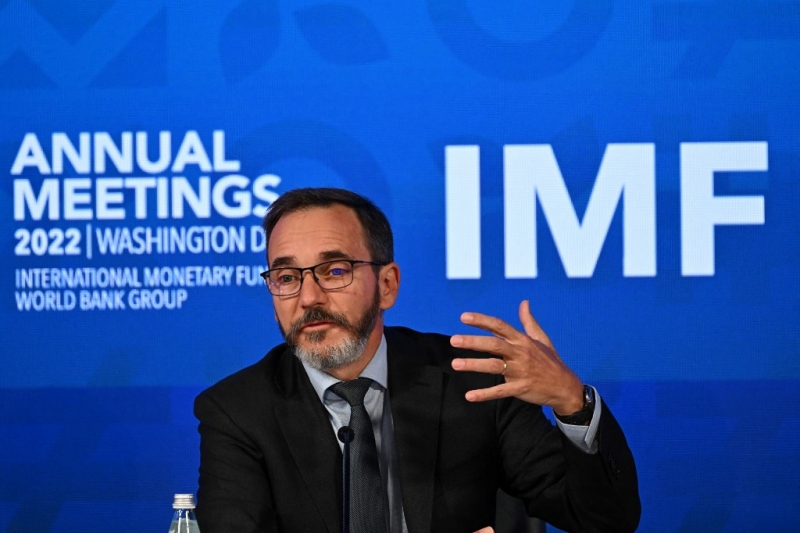The IMF warned in its latest major report on the global economic outlook. Inflationary pressure leading to interest rate hikes Mixed crisis of plant energy and food prices It is causing the global economy to enter recession and threatens the stability of the financial market. Countries accounting for a third of world production could fall into this situation next year. The world’s three major economies – the US, China and the EU – have all slowed down.
In a report released on Tuesday (October 11), the start of the annual meeting for the fall semester, of the International Monetary Fund (IMF) and the World Bank. It continues to fight inflation despite the painful consequences of a tighter monetary policy. The dollar, meanwhile, rose to a record high in two years, also driven by a sharp rise in interest rates by the US Federal Reserve (Fed), two of the main factors that have recently driven volatility in global financial markets. .
IMF report The global economic growth forecast for 2023 has been revised to 2.7% from the 2.9% forecast in a previous report updated in July. in the midst of an unknown situation The Fed’s sharp rise in interest rates caused a slowdown in the US economy. Europe has to deal with rising energy prices. And China continues to use lockdown measures to curb the coronavirus as the real estate sector stagnates.
Pierre-Olivier Gurinchas, the IMF’s chief economist, said the country which accounts for a third of global production could go into recession next year. Meanwhile, the growth of the world’s three largest economies – America, China and the European Union (EU) – will continue to slow. In summary, it is For many people The worst was yet to come. And you might think 2023 is the year of the recession.
For this year, the IMF kept its global economic growth forecast at 3.2%, reflecting the unexpected growth in European production. as America’s growth slowed Compare that to a high growth rate of 6% last year after the coronavirus crisis subsided.
The IMF report added that Some large European countries will enter a technical recession next year. This includes Germany and Italy. while energy prices skyrocket and production shortages
At the same time, China’s growth trend is downgraded. from maintaining lockdown measures to prevent covid and a sluggish real estate sector that will further slow China’s growth.
The IMF report also says Growing economic pressures coupled with reduced liquidity Inflation shows no signs of declining and prolonged financial volatility This increases the risk of asset prices chaotically adjusting and leading to an escalation of the volatile situation in the markets financial.
Treasury officials from 190 IMF and World Bank member states this week Let’s meet in Washington to find out how to address these uncertainties. Since they have different economic positions. They also faced the food and energy price crisis following the war in Ukraine. and other global challenges This includes the need for substantial funding for clean energy development.
The IMF has stressed Central banks must try to find a middle ground in fighting inflation without an overly restrictive monetary policy that could unnecessarily push the global economy into a severe recession. And it adds to the pain of emerging market economies as their currencies plummet against the dollar.
However, Gurinchas pointed out that.However, controlling inflation is more important. and cutting the paper too fast could undermine the credibility that the central bank has had a hard time earning.
The World Bank expects global inflation will peak at 9.5% in the third quarter of this year and drop to 4.7% in the final quarter of next year.
However, the outlook for the global economy could be much darker if faced with multiple impacts simultaneously. This includes a 30 percent increase in oil prices from current levels that will reduce global economic growth by 1 percent next year.
other negative factors The downward trend also includes a financial squeeze due to the depreciation of the currency in emerging markets. and an overheated labor market that has reduced productivity.
Gurinchas warned that The global economy could have avoided a recession, but there is a one in four chance that growth could drop to 2% or less, which has only happened five times since 1970, like the 1973 oil crisis. , a slowdown in inflation. 1981 and the 2008 financial crisis all had a huge impact on the global economy.
(Source: AFP, Reuters)


![[국제]Japanese Nissan sells Russian assets for ‘1 euro’ … Stop loss amid growing nuclear threat [국제]Japanese Nissan sells Russian assets for ‘1 euro’ … Stop loss amid growing nuclear threat](https://image.ytn.co.kr/general/jpg/2022/1012/202210122306212645_t.jpg)